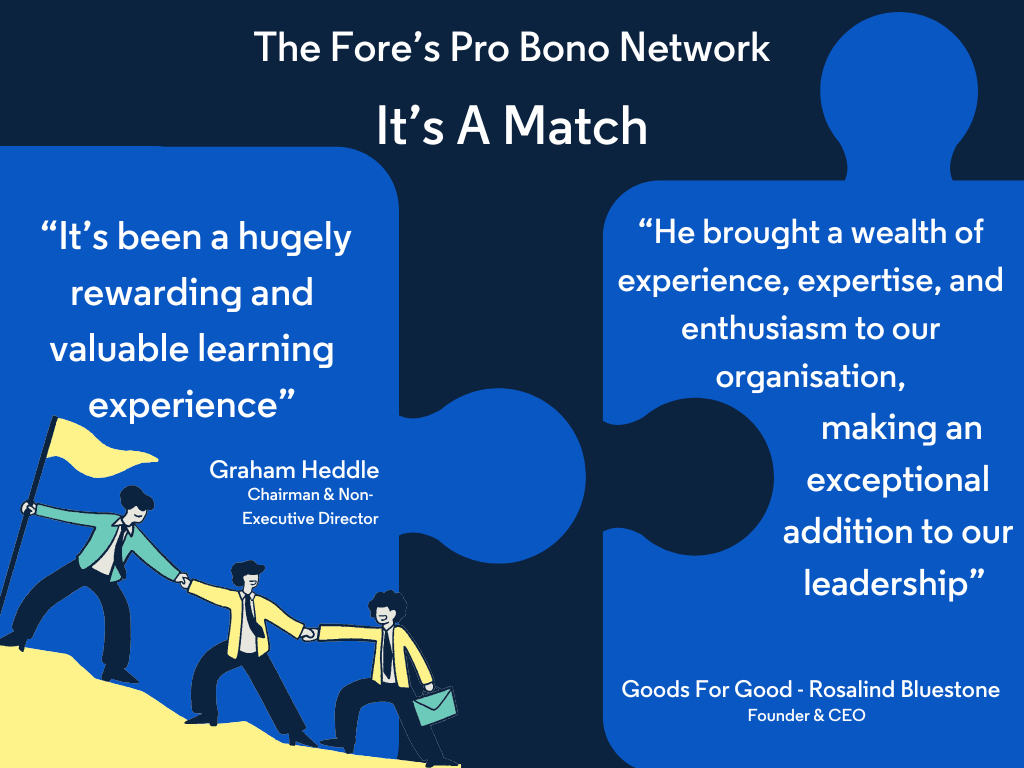The Three Keys to Success in a Non-Executive Charity Role
October 28, 2024

Strong governance is crucial to any charity’s success; therefore, taking on a non-executive charity role can feel like a significant commitment, but it can lead to immense personal and professional rewards. If you’re interested in finding out more about how your skills are transferable, The Fore can help. We specialise in matching professionals with leadership roles in small, innovative charities, and we have been delighted to do just that for Graham Heddle at Goods for Good.
Goods for Good redistributes unsold items like clothing footwear, bedding and toiletries to frontline organisations. Over the past eight years, they’ve delivered £36.6m of goods to three million people in 27 countries. Graham, a private equity professional, was introduced by The Fore’s Founder and CEO, Mary Rose, who immediately recognised Graham as the perfect fit for the Chair role.
Graham leveraged his corporate experience to make a meaningful impact, demonstrating how skills from the business world can drive success in the charity sector. If you’re considering skilled volunteering, a non-executive role, or even stepping into a Chair position like Graham, here are three key qualities that helped him succeed – and can help you too:
- Taking Time to Understand the Cause
From the outset, Graham took the time to understand Goods for Good’s mission, its operational challenges, and the communities it serves, which helped him build a solid foundation for effective leadership.
He was then able to leverage his experience in private equity, along with his skills in business growth and governance to fully immerse himself in the role.
Reflecting on his experience, Graham said, “I’ve got involved with all aspects of the charity, and it’s been a hugely rewarding and valuable learning experience.”
2. Bringing a Strategic, Future-Focused Mindset
When Graham joined, Goods for Good was entering an exciting phase of growth. “Graham’s appointment marks a pivotal moment for us,” remarked Rosalind Bluestone, Founder and CEO of Goods for Good. “He brought a wealth of experience, expertise, and enthusiasm to our organisation, making him an exceptional addition to our leadership team.”
Graham worked closely with the team to refine fundraising strategies, establish realistic timelines, and develop long-term plans for sustainability. His strategic thinking helped shape the charity’s direction, ensuring it could navigate growth and transformation.
3. Having a Broad Perspective to Notice Areas for Improvement
Graham understood the importance of fostering teamwork within the organisation and saw opportunities to enhance collaboration, further strengthening the team’s effectiveness.
As the charity noted, “Graham has given us direction, guiding us on fundraising, systems challenges, and AI insights, helping us integrate these into our everyday work.” His collaborative approach fostered teamwork and open communication. By ensuring diverse perspectives were heard and encouraging shared decision-making, Graham has helped to create an even more inclusive leadership culture that empowered the team to succeed.
Graham Heddle’s experience with Goods for Good demonstrates how passion, strategic vision and collaboration can make a lasting impact in the charity sector.
At The Fore, we are committed to helping professionals find opportunities to use your talents to make a difference. Whether you’re considering a Chair role or another leadership position, these key qualities can help you succeed.
Ready to take the leap? Get in touch today with our Pro Bono team at probono@thefore.org and explore our directory to explore our portfolio of charities in need of leadership. We can help align you with a charity that matches your skills and preferred cause.
